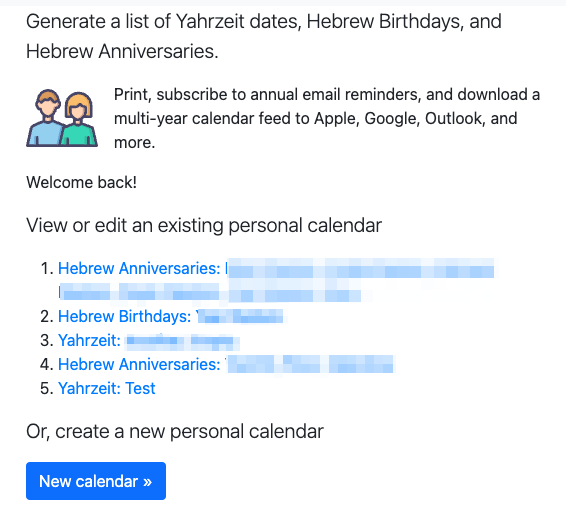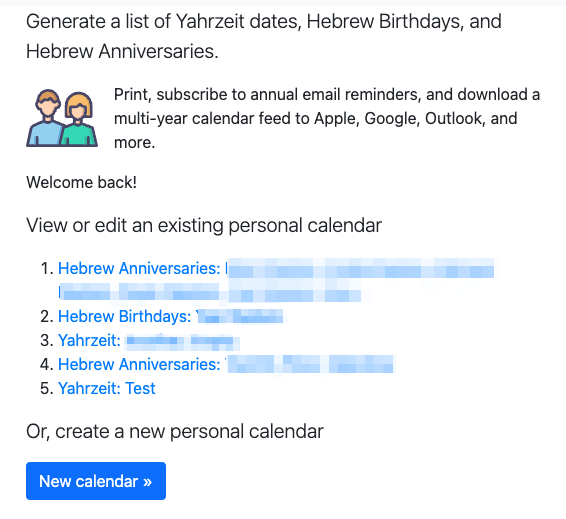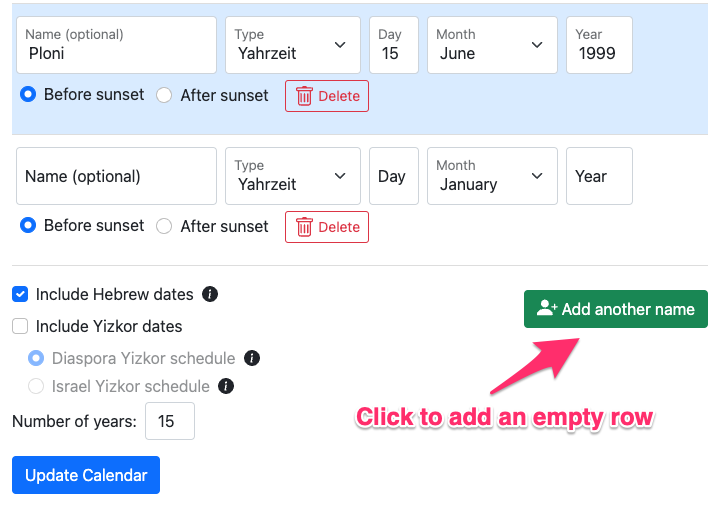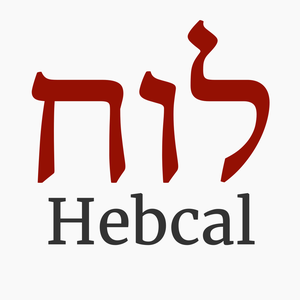Your comments
Hi, thanks for using Hebcal's Yahrzeit + Anniversary calendar!
If you visit https://www.hebcal.com/yahrzeit in the same web browser where you earlier created a calendar, you will now see a page that looks like this:

If you click one of the existing personal calendar links, you can share the URL with someone else.
Please note that sharing the calendar shares both view and edit permissions. They will be able to make changes, including adding new names or deleting existing names. Only share the URL with someone that you trust.
Hi, thanks for using Hebcal.
We're sorry to hear that you're having difficulty with Hebcal yahrzeit calendars and Outlook.
Unfortunately, we aren't able to offer any useful suggestions to fix the problem. We have never seen an issue like this before, and you are the first user to report such a problem.
We can leave this question open in the hopes that someone else will find the solution and post the answer here.
If you return to the https://www.hebcal.com/yahrzeit page from the same web browser you used earlier, you should now see a page that lists your previously created calendars:

Then, click on an existing personal calendar link.
Near the bottom of the page, you'll see a green button that says "Add another name"

Fill out the new row and click the blue "Update Calendar" button at the bottom of the page.
Hi, thanks for using Hebcal.
We regret that we do not currently offer a personalized zmanim service (alot haShachar, mincha ketana, etc).
We do offer candle-lighting and havadalah times for holidays and fast/start end times via https://www.hebcal.com/hebcal
Try this API. This is the best we can offer. Good luck and Shabbat shalom!
https://www.hebcal.com/home/219/hebrew-date-converter-rest-api
if you are not a JavaScript developer, you might consider using our CSV export instructions
Hi, thanks for using Hebcal.
If you're a JavaScript developer, the most flexible way to generate Jewish holiday and Hebrew date events is to use the @hebcal/core npm package. https://www.npmjs.com/package/@hebcal/core
We also offer many different web developer APIs that you can use via JavaScript or any programming language
https://www.hebcal.com/home/developer-apis
Best of luck!
Hi, thanks for using the Hebcal Hebrew/Gregorian date converter.
https://www.hebcal.com/converter?gd=17&gm=3&gy=1968&g2h=1
Sun, 17 March 1968 (before sunset) = 17th of Adar, 5728
Hebrew year 5728 was not a leap year (note month: Adar).
Since Hebrew Year 5728 was not a leap year, our converter page displays "Adar" as there is no ambiguity about the month of Adar in a non-leap year.
Hi, thanks for using Hebcal's triennial Torah Reading feature.
In December 2021 we updated our Triennial readings to reflect the November 2020 responsa from the CJLS which modified the 3rd year readings for a half-dozen parshiyot. We published a short note about this change on the Hebcal.com website here:
https://www.hebcal.com/home/3824/triennial-torah-reading-revision
Since you reference Yad LaTorah from 2002, this obviously was published before the November 2020 CJLS responsa. So Yad LaTorah was correct at the time it was published, but it has become out-of-date.
Customer support service by UserEcho


Hi Ms. Jackler, thanks for using Hebcal.
We checked our security certificate and we think it's perfectly fine.
https://www.sslshopper.com/ssl-checker.html#hostname=hebcal.com
Can you double-check your web browser and make sure you're running a recent version of Chrome, Safari, Firefox or Edge?